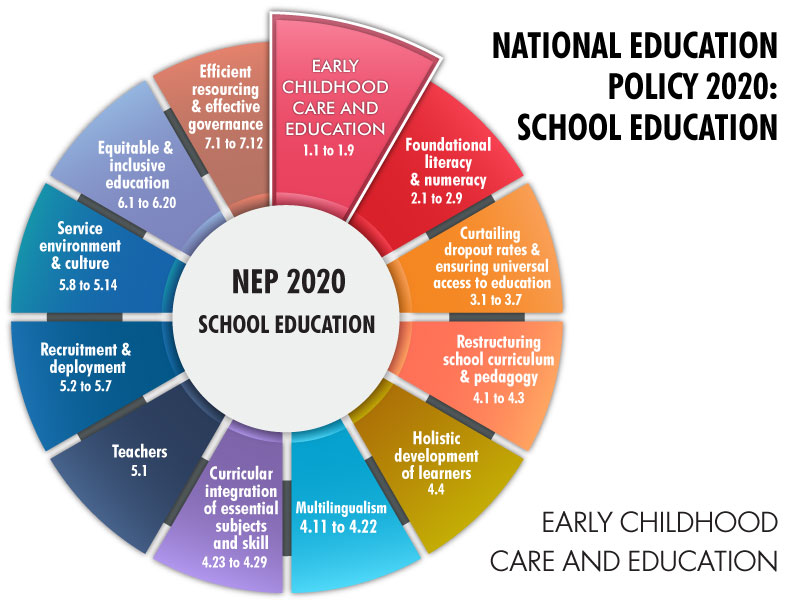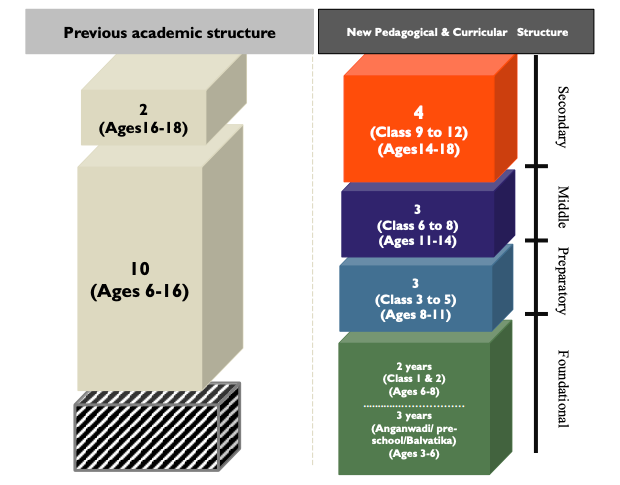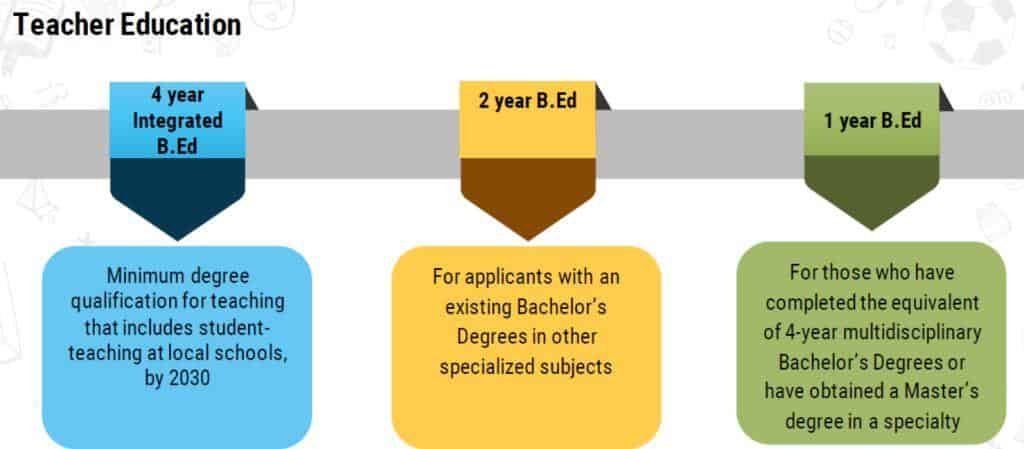The country is abuzz with the new NEP [https://www.mhrd.gov.in/sites/upload_files/mhrd/files/NEP_Final_English_0.pdf] and all educators are evaluating it to understand its implications and impact and why shouldn't they? Foremost, let me share the vision is progressive and crisp revolving around galvanizing teachers to communicate quality education to students, simply strengthening SDG 4 for all.
'Education Policy lays particular emphasis on the development of the creative potential of each individual. It is based on the principle that education must develop not only cognitive capacities - both the ‘foundational capacities ’of literacy and numeracy and ‘higher-order’ cognitive capacities, such as critical thinking and problem-solving – but also social, ethical, and emotional capacities and dispositions'.
It has laid out what we have been desiring for long and now we want an equivalent action plan to ensure its reach.
The first people to be affected are the Management as they will view it from a structural point of view. So, let's understand what those changes will be and how they could be implemented.
As per NEP for Early Childhood Care and Education - A National Curricular and Pedagogical Framework for Early Childhood Care and Education (NCPFECCE) for children up to the age of 8 will be developed by NCERT in two parts, namely, a sub-framework for 0-3 year-olds, and a sub-framework for 3-8 year-olds, aligned with the above guidelines, the latest research on ECCE, and national and international best practices - A ratio of 30:1 pupils: teachers are desired to have optimum output.
What does Management need to do?
1. Management needs to restructure the entire structure and term it as Foundational, Preparatory, Middle Stage, and Secondary Stage for all stakeholders to gain clarity and understanding. Currently, we are used to the terms Pre-primary, Primary and Secondary and Higher Secondary.
2. It needs to hire an adequate number of teachers to reach the ratio. Currently, few schools have 80 -90 students in a class and teachers find it difficult to manage.
3. It needs to enroll existing teachers without an ECCE Certificate for either a 6 month to the 1-year course.
4. It needs to coordinate with the Academic Team of the school for curriculum revisions and resources.
5. Management needs to review the physical environment of the school for safety and security. It needs to build the school library for both physical and digital books and have Academic Team use the DIKSHA [digital Infrastructure for Knowledge Sharing] platform to attain high-quality resources.
6. In rural areas or anganwadis ensure adequate food is served to students and in all setups, regular health checkups are organized.
6. It needs to create a database of qualified volunteers and professionals within the community to support the educators and students for mentoring and guidance.
'As per the NEP, Curriculum content will be reduced in each subject to its core essentials, to make space for critical thinking and more holistic, inquiry-based, discovery-based, discussion-based, and analysis-based learning. The mandated content will focus on key concepts, ideas, applications, and problem-solving. Teaching and learning will be conducted in a more interactive manner; questions will be encouraged, and classroom sessions will regularly contain more fun, creative, collaborative, and exploratory activities for students for deeper and more experiential learning'.
What does it expect from the Management?
1. Review with the Head of School of the teaching strategies prevalent in the system at present and the training mandated to shift classroom interaction from rote learning to learning how to learn.
2. Conduct a PDSA with the Heads of the School to design assessments that promote critical thinking and problem solving and instill 21st-century skills.
3. Ask the school team to share the cross-curricular pedagogical approach they will implement in classroom interactions to bring in art, culture, and sports.
3. Design a regular monitoring system to review academic progress.
As per NEP, Students will be given increased flexibility and choice of subjects to study, particularly in secondary school - including subjects in physical education, the arts and crafts, and vocational skills – so that they can design their own paths of study and life plans
What does it expect from the Management?
1. Review the current choice of subjects offered at the school level and connect with the respective Education board for more choices. Ex: ICSE and IGCSE offer a range of subjects and schools can offer more choices like Cookery, Fashion designing after considering the feasibility and resources.
2. Vocational skills are given more prominence and students can opt for them at a Secondary level.
3. The school does not hold curricular more important than cocurricular and give it equal importance. This message is manifested in the actions of all stakeholders through regular workshops and meetings and actions.
4. Give prominence to home language wherever possible. Make efforts early on to ensure that any gaps that exist between the language spoken by the child and the medium of teaching are bridged. Teachers can support students using a bilingual approach.
5. Introduce as many languages as possible at the Foundational stage and hire teachers who have a good command over many languages. Continue with the three-language formula and ensure two of the three languages are native to India. Ex: If the first language in school is English, the second language is Mother Tongue and the third language is the State language. At the Secondary level, schools can introduce foreign languages for the students to study.
As per NEP,
- Activities involving coding will be introduced in Middle Stage.
- A practice-based curriculum for Grades 6-8 will be appropriately designed by NCERT while framing the NCFSE 2020-21. All students will participate in a 10-day bagless period sometime during Grades 6-8 where they intern with local vocational experts such as carpenters, gardeners, potters, artists, etc.
What does it expect from the Management?
1. Create a strong community reaches for students to participate in varied internships like carpentry, gardening, pottery etc.
2. Revisit the projects shared by the teachers with students along with the Head of School and bring in modified change.
3. Introduce coding as a subject for students and have them develop computational skills.
4. Educational excursions/ Field trips are more centered around places/monuments of historical, cultural, and tourist importance, meeting local artists and craftsmen and visits to higher educational institutions in their village/Tehsil/District/State.
5. Organize cultural exchange programs for students with students of other states so that they develop 'Knowledge of India' and respect for the rich culture.
6. Bring in 'Value Education' within the curriculum.
The aim of assessment in the culture of our schooling system will shift from one that is summative and primarily tests rote memorization skills to one that is more regular and formative, is more competency-based promotes learning and development for our students and tests higher-order skills, such as analysis, critical thinking, and conceptual clarity.
What does it expect from the Management?
1. The Management with the Head of the School needs to organize training for the teachers to bring in a mindset shift as over the years they have worked towards preparing students for marks and not skills.
2. It needs to have the Principal along with teachers design a progress card that is holistic, 360-degree, multidimensional report that reflects in great detail the progress as well as the uniqueness of each learner in the cognitive, affective, and psychomotor domains.
3. To not measure school success through Board exam results but student competencies.
4. To invest in creating a tracking process that monitors student performance throughout the school years.
5. To understand the expectations and execution practices of National Assessment Centre, PARAKH (Performance Assessment, Review, and Analysis of Knowledge for Holistic Development).
6. To partake in sharing of best practices among school boards, and for ensuring equivalence of academic standards among learners across all school boards.
As per NEP, Teachers will aim to encourage students with singular interests and/or talents in the classroom by giving them supplementary enrichment material and guidance and encouragement.
What does it expect from Management?
1. Create a variety of clubs within the school for students to participate in like Science Circles, Math Circles, Music & Dance Performance Circles, Chess Circles, Poetry Circles, etc.
2. Have students participate in a variety of competitive competitions like Olympiads etc
3. Develop smart classrooms for digital pedagogy.
As per NEP, Teacher Eligibility Tests (TETs) will be strengthened to inculcate better test material, both in terms of content and pedagogy. The TETs will also be extended to cover teachers across all stages (Foundational, Preparatory, Middle and Secondary) of school education.
Each teacher will be expected to participate in at least 50 hours of CPD opportunities every year for their own professional development, driven by their own interests.
What does it expect from Management?
1. Modify the current HR practices and recruitment regulations.
2. Identify teachers without adequate training and put them in the much needed professional development course.
3. Create a school budget for sending Principal and Teachers for training/workshops/learning platforms of minimum of 50 hours per year.
4. Involve teachers in the governance of schools/school complexes.
5. Analyze the current appraisal process and modify it to ensure that career growth (in terms of tenure, promotions, salary increases, etc.) is available to teachers within a single school stage.
6. Study the National Professional Standards for Teachers (NPST) which will be developed by 2022, by the National Council for Teacher Education to appraise the system of the expectations of the role of the teacher at different levels of expertise/stage, and the competencies required for that stage.
7. Ensure you have trained Special Educators to offer inclusive education to all. Teachers must be helped to identify such learning disabilities early and plan specifically for their mitigation.
As per NEP, The SSSA will establish a minimal set of standards based on basic parameters (namely, safety, security, basic infrastructure, number of teachers across subjects and grades, financial probity, and sound processes of governance), which shall be followed by all schools. The framework for these parameters will be created by the SCERT in consultation with various stakeholders, especially teachers and schools.
What is expected of the Management?
1. Ensure your school is ready with all relevant documentation at all stages.
2. Train the entire school team for the assessment and accreditation process.
3. Ensure a strong bond is developed with SCERT to ensure quality education to all.
Further, there is a lot more desired to uplift students of all sections across the country to prepare them for an uncertain future where AI, AR, ML, VR and so much has taken over.
The above inputs belong to the author using the NEP as guidance and would appreciate more inputs from experts across the country to support every school to be prepared for the successful implementation and execution of the NEP.





Very well explained from management perspectives.Implemntation is a big question mark where in teachers have to play an important role in the changed scenario.
ReplyDeleteExcellent analysis
ReplyDeleteWell.explained but here is big question is school management go with vision of NEP2020
ReplyDeleteSuccess of NEP2020 depends upon school management will they relive teachers for training, will they provide infrastructure for effective implementation
Also I wonder if teacher trainers are adept to take on the load ??
ReplyDeleteAt the outset the professional narrative was spot on with clarity on every stage of the NEP implementation - Educational reforms the world over address issues from curriculum and pedagogical perspectives but from the teacher perspective we need urgently the transitional PD where the ownership to learning can happen through technological collaboration wherein the learners are adept but the traditional schooling system has more baggage of irrelevant procedures to adapt. Can there be a process in place to identity such wastage and stagnation and reduce the overload on the teacher. Contemporary teachers are tremendously effective if they are delegated and empowered to have access to innovative and creative approaches in developing learning skills in learners more than content and product based delivery.
ReplyDelete